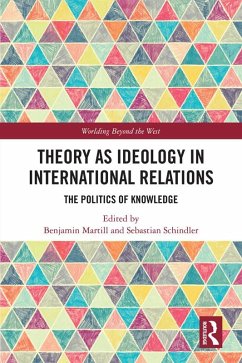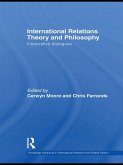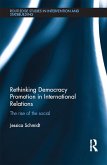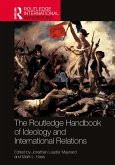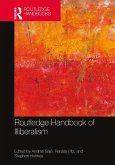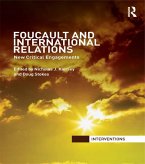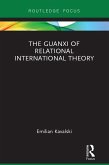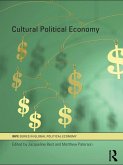Theory as Ideology in International Relations (eBook, PDF)
The Politics of Knowledge
Redaktion: Martill, Benjamin; Schindler, Sebastian
42,95 €
42,95 €
inkl. MwSt.
Sofort per Download lieferbar

21 °P sammeln
42,95 €
Als Download kaufen

42,95 €
inkl. MwSt.
Sofort per Download lieferbar

21 °P sammeln
Jetzt verschenken
Alle Infos zum eBook verschenken
42,95 €
inkl. MwSt.
Sofort per Download lieferbar
Alle Infos zum eBook verschenken

21 °P sammeln
Theory as Ideology in International Relations (eBook, PDF)
The Politics of Knowledge
Redaktion: Martill, Benjamin; Schindler, Sebastian
- Format: PDF
- Merkliste
- Auf die Merkliste
- Bewerten Bewerten
- Teilen
- Produkt teilen
- Produkterinnerung
- Produkterinnerung

Bitte loggen Sie sich zunächst in Ihr Kundenkonto ein oder registrieren Sie sich bei
bücher.de, um das eBook-Abo tolino select nutzen zu können.
Hier können Sie sich einloggen
Hier können Sie sich einloggen
Sie sind bereits eingeloggt. Klicken Sie auf 2. tolino select Abo, um fortzufahren.

Bitte loggen Sie sich zunächst in Ihr Kundenkonto ein oder registrieren Sie sich bei bücher.de, um das eBook-Abo tolino select nutzen zu können.
New global lines of political conflict have brought into view fundamentally different conceptions of international politics, and the neutrality of academic expertise has itself come to be questioned by political actors. The political crisis of liberal world order and the academic crisis of critical theory are the subject of this book.
- Geräte: PC
- ohne Kopierschutz
- eBook Hilfe
- Größe: 2.66MB
Andere Kunden interessierten sich auch für
![International Relations Theory and Philosophy (eBook, PDF) International Relations Theory and Philosophy (eBook, PDF)]() International Relations Theory and Philosophy (eBook, PDF)46,95 €
International Relations Theory and Philosophy (eBook, PDF)46,95 €![Rethinking Democracy Promotion in International Relations (eBook, PDF) Rethinking Democracy Promotion in International Relations (eBook, PDF)]() Jessica SchmidtRethinking Democracy Promotion in International Relations (eBook, PDF)43,95 €
Jessica SchmidtRethinking Democracy Promotion in International Relations (eBook, PDF)43,95 €![The Routledge Handbook of Ideology and International Relations (eBook, PDF) The Routledge Handbook of Ideology and International Relations (eBook, PDF)]() The Routledge Handbook of Ideology and International Relations (eBook, PDF)47,95 €
The Routledge Handbook of Ideology and International Relations (eBook, PDF)47,95 €![Routledge Handbook of Illiberalism (eBook, PDF) Routledge Handbook of Illiberalism (eBook, PDF)]() Routledge Handbook of Illiberalism (eBook, PDF)84,95 €
Routledge Handbook of Illiberalism (eBook, PDF)84,95 €![Foucault and International Relations (eBook, PDF) Foucault and International Relations (eBook, PDF)]() Foucault and International Relations (eBook, PDF)56,95 €
Foucault and International Relations (eBook, PDF)56,95 €![The Guanxi of Relational International Theory (eBook, PDF) The Guanxi of Relational International Theory (eBook, PDF)]() Emilian KavalskiThe Guanxi of Relational International Theory (eBook, PDF)23,95 €
Emilian KavalskiThe Guanxi of Relational International Theory (eBook, PDF)23,95 €![Cultural Political Economy (eBook, PDF) Cultural Political Economy (eBook, PDF)]() Cultural Political Economy (eBook, PDF)53,95 €
Cultural Political Economy (eBook, PDF)53,95 €-
-
-
New global lines of political conflict have brought into view fundamentally different conceptions of international politics, and the neutrality of academic expertise has itself come to be questioned by political actors. The political crisis of liberal world order and the academic crisis of critical theory are the subject of this book.
Dieser Download kann aus rechtlichen Gründen nur mit Rechnungsadresse in A, B, BG, CY, CZ, D, DK, EW, E, FIN, F, GR, HR, H, IRL, I, LT, L, LR, M, NL, PL, P, R, S, SLO, SK ausgeliefert werden.
Produktdetails
- Produktdetails
- Verlag: Taylor & Francis eBooks
- Seitenzahl: 268
- Erscheinungstermin: 13. März 2020
- Englisch
- ISBN-13: 9780429667732
- Artikelnr.: 58801732
- Verlag: Taylor & Francis eBooks
- Seitenzahl: 268
- Erscheinungstermin: 13. März 2020
- Englisch
- ISBN-13: 9780429667732
- Artikelnr.: 58801732
- Herstellerkennzeichnung Die Herstellerinformationen sind derzeit nicht verfügbar.
Benjamin Martill is Lecturer in Politics and International Relations at the University of Edinburgh, UK, where he conducts research and teaching on the politics of European foreign and security policy. He is co-editor (with Uta Staiger) of the volume Brexit and Beyond: Rethinking the Futures of Europe (2018) and his work has featured in Security Studies, International Politics, the Journal of Political Ideologies and the British Journal of Politics and International Relations. He has previously worked at the London School of Economics, University College London, Canterbury Christ Church University and the University of Oxford. Sebastian Schindler is Research Associate at Geschwister-Scholl-Institute for Political Science, Ludwig Maximilians Universität, Munich, Germany. His research interests include theories of International Relations, international organisations, theories of practice and critical theories. He holds a doctoral degree from Goethe University, Frankfurt/Main, Germany, and has published articles in leading journals of the field, including International Studies Quarterly, International Theory and Politische Vierteljahresschrift. In 2014, he won Millennium - Journal of International Studies' F.S. Northedge Essay Competition, with an article on contested agency in the United Nations. In 2019, a special issue on 'Rethinking Agency in International Relations', which he co-edited with Benjamin Braun and Tobias Wille, appeared in the Journal of International Relations and Development. The focus of his current research lies on the problem of post-truth politics.
Introduction: Theory as Ideology in International Relations Part I:
Understanding Theory and Ideology 1. Theory vs. Ideology: Validity Criteria
for Knowledge Claims and Normative Conditions of Critique 2. Ideology as
Decontestation 3. Theory, Ideology and IR's Quest for Scientific
Credibility 4. 'I see Something You Don't See': Niklas Luhmann's Social
Theory between Observation and Meta-Critique Part II: Contemporary Theories
as Ideologies 5. The Costs of the Democratic Turn in Political Theory 6.
The Spirits We Cite: How Democratic War Theory Reproduces what it Opposes
7. From Theory to Practice: The Paradox of Neoliberal Hegemony in
Twenty-First-Century World Politics 8. Liberalism and the Cold War: The
International Thought of Jo Grimond Part III: Theorisation outside Academia
9. Ideologies of International Organisation: Exploring the Trading Zones
between Theory and Practice 10. From Allegations of Ideology to Conflicts
over Forms of Life: Or, Why Political Scientists Don't Talk about
Ecovillages 11. Microanalysis as Ideology Critique: The Critical Potential
of 'Zooming In' on Everyday Social Practices Conclusion: From the Politics
of Knowledge to Knowledge of Politics
Understanding Theory and Ideology 1. Theory vs. Ideology: Validity Criteria
for Knowledge Claims and Normative Conditions of Critique 2. Ideology as
Decontestation 3. Theory, Ideology and IR's Quest for Scientific
Credibility 4. 'I see Something You Don't See': Niklas Luhmann's Social
Theory between Observation and Meta-Critique Part II: Contemporary Theories
as Ideologies 5. The Costs of the Democratic Turn in Political Theory 6.
The Spirits We Cite: How Democratic War Theory Reproduces what it Opposes
7. From Theory to Practice: The Paradox of Neoliberal Hegemony in
Twenty-First-Century World Politics 8. Liberalism and the Cold War: The
International Thought of Jo Grimond Part III: Theorisation outside Academia
9. Ideologies of International Organisation: Exploring the Trading Zones
between Theory and Practice 10. From Allegations of Ideology to Conflicts
over Forms of Life: Or, Why Political Scientists Don't Talk about
Ecovillages 11. Microanalysis as Ideology Critique: The Critical Potential
of 'Zooming In' on Everyday Social Practices Conclusion: From the Politics
of Knowledge to Knowledge of Politics
Introduction: Theory as Ideology in International Relations Part I:
Understanding Theory and Ideology 1. Theory vs. Ideology: Validity Criteria
for Knowledge Claims and Normative Conditions of Critique 2. Ideology as
Decontestation 3. Theory, Ideology and IR's Quest for Scientific
Credibility 4. 'I see Something You Don't See': Niklas Luhmann's Social
Theory between Observation and Meta-Critique Part II: Contemporary Theories
as Ideologies 5. The Costs of the Democratic Turn in Political Theory 6.
The Spirits We Cite: How Democratic War Theory Reproduces what it Opposes
7. From Theory to Practice: The Paradox of Neoliberal Hegemony in
Twenty-First-Century World Politics 8. Liberalism and the Cold War: The
International Thought of Jo Grimond Part III: Theorisation outside Academia
9. Ideologies of International Organisation: Exploring the Trading Zones
between Theory and Practice 10. From Allegations of Ideology to Conflicts
over Forms of Life: Or, Why Political Scientists Don't Talk about
Ecovillages 11. Microanalysis as Ideology Critique: The Critical Potential
of 'Zooming In' on Everyday Social Practices Conclusion: From the Politics
of Knowledge to Knowledge of Politics
Understanding Theory and Ideology 1. Theory vs. Ideology: Validity Criteria
for Knowledge Claims and Normative Conditions of Critique 2. Ideology as
Decontestation 3. Theory, Ideology and IR's Quest for Scientific
Credibility 4. 'I see Something You Don't See': Niklas Luhmann's Social
Theory between Observation and Meta-Critique Part II: Contemporary Theories
as Ideologies 5. The Costs of the Democratic Turn in Political Theory 6.
The Spirits We Cite: How Democratic War Theory Reproduces what it Opposes
7. From Theory to Practice: The Paradox of Neoliberal Hegemony in
Twenty-First-Century World Politics 8. Liberalism and the Cold War: The
International Thought of Jo Grimond Part III: Theorisation outside Academia
9. Ideologies of International Organisation: Exploring the Trading Zones
between Theory and Practice 10. From Allegations of Ideology to Conflicts
over Forms of Life: Or, Why Political Scientists Don't Talk about
Ecovillages 11. Microanalysis as Ideology Critique: The Critical Potential
of 'Zooming In' on Everyday Social Practices Conclusion: From the Politics
of Knowledge to Knowledge of Politics
